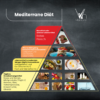Description
Discover the Mediterranean diet revolution
Imagine yourself walking through the Mediterranean diet and a targeted Change of diet Your health goals in cities such as Berlin, Hamburg, Munich, Cologne, Frankfurt am Main and Stuttgart reach.
Our specifically tailored Weight loss coaching supports you in finding an effective Weight reduction and supply your body with valuable nutrients.
Let experienced Nutritionists guide you through your process and discover a variety of Diet recipeswhich are specially tailored to the Mediterranean diet are coordinated.
This will teach you how to Get rid of belly fat, Fighting cravings and your Change your eating habits can.
Data protection and individual support
Data protection is a top priority at our Nutritional advice is a top priority. Your personal data will be treated confidentially and used exclusively to optimize your Weight reduction used. Thanks to customized nutritional strategies, your individual needs are always at the forefront, without compromising on safety.
The Mediterranean diet is an important building block that ensures a sustainable and healthy Diet and is optimally integrated into our individual care concepts.
The role of the Mediterranean diet for healthy weight loss
The Mediterranean diet is one of the most effective and enjoyable ways to lose weight sustainably. With selected Diet recipes and an individually tailored Diet plan for losing weight it supports you in achieving your health goals.
In combination with a Low carb diet the Mediterranean diet offers a variety of ways to boost your metabolism and burn fat in a targeted manner. Our programs include healthy recipes for losing weight that are easy to integrate into everyday life and help to ensure success without sacrifice.
Modern nutrition plans and cookie notice
We offer innovative nutrition planswhich can be found on the Mediterranean diet and can be perfectly integrated into your everyday life. Our experienced Nutritionists support you in finding an individual Diet-Plan for a healthy weight loss and implement them successfully.
When you visit our website, you will be directed to a Cookie notice which informs you about the use of cookies that help us personalize your browsing experience. Weight loss coaching help. By accepting our cookies, you will benefit from a customized Online nutritional advice and a user experience that is precisely tailored to your needs.
Benefits of the Mediterranean diet: energy and focus
The Mediterranean diet is characterized by fresh and nutrient-rich foods such as olive oil, fish, vegetables and whole grain products. Thanks to these high-quality ingredients, you can Blood sugar level stable and Cravings more effectively.
A well-structured Diet plan for losing weight on the basis of the Mediterranean diet supports you in finding the right balance between enjoyment and healthy Diet to be found. The high proportion of healthy fats provides long-lasting energy, promotes mental clarity and helps you to stay focused on your work. Burn fat to stay constantly on the ball.
Understanding the Mediterranean metabolism
The Metabolism adapts to the nutrient composition of your diet. With the Mediterranean diet the combination of valuable fatty acids, fiber and proteins ensures that you support your body in a targeted manner with the Burn fat and Reduce body fat support.
This process promotes a sustainable Weight loss and improves your general health. Our Nutritional advice accompanies you step by step on this path so that you can achieve your nutritional goals safely and effectively.
Mediterranean diet and low-carb nutrition
Although the Mediterranean diet is rich in vegetables and whole grain products, in many cases it can be perfectly combined with a Low carb diet for example, by reducing simple carbohydrates and focusing more on natural foods.
Our experienced Nutritionists develop individually customizable Diet-concepts that offer you the opportunity to combine the advantages of both forms of nutrition. In this way, you create the optimum conditions for a healthy weight loss and sustainable Fat loss.
Familiar questions about losing weight
Many people are concerned with questions such as:
How do I lose weight?
How can I lose weight quickly?
How do I reduce my weight?
What helps with fat loss?
How can I burn fat?
How do I manage to change my diet?
Our experienced Nutritionist supports you in finding the right Diet to find - for example the proven Mediterranean diet - and accompanies you on your way to a healthy weight lossthat has a long-term effect and can be easily integrated into your everyday life.
Healthy alternatives and controlling cravings
One of the main objectives of our programs is to help you healthy alternatives which are particularly important for the Mediterranean diet are easy to implement. With lots of vegetables, fruit, pulses and nuts, you will learn, Fighting cravings without sacrificing enjoyment. We support you in this, Change your eating habits and provide your body with the nutrients it needs.
Recipes for the Mediterranean diet
Our Nutritional advice holds a range of delicious Mediterranean diet recipes all based on fresh, high-quality ingredients. These recipes will help you, Implementing a sustainable diet by adding variety and enjoyment to your diet. This will make it easier for you to stay on the ball in the long term.
The power of the right energy sources
With the focus on Olive oil, fresh vegetables and lean protein sources your body can efficiently utilize the energy it needs. This leads to increased performance in everyday life and favors the Fat burning. By using your Optimize nutritionyou can achieve a new level of energy that will not only affect the scales, but also your well-being.
Tips for quick and easy snacks
Also with the Mediterranean diet small snacks are allowed as long as they Nutrient-rich and are not excessively high in calories. Our experts will show you how you can, for example Vegetable sticks with hummus or Fruits with yogurt into your everyday life to Cravings and to prevent the Weight loss process support.
Growing popularity of the Mediterranean diet
The Mediterranean diet is enjoying increasing popularity, as it not only provides an ideal basis for Weight reduction but can also reduce the risk of cardiovascular disease and promote general health. This diet is flexible and compatible with a variety of lifestyles, which makes its Sustainability additionally emphasizes.
The role of carbohydrates in your diet
Even if the Mediterranean diet rich in Vegetables and Wholemeal products the selection of the right carbohydrates plays a decisive role. We help you to find a sensible balance between complex and simple carbohydrates so that you can maintain a healthy diet. Diet easily integrated into everyday life and Burn fat without feeling drained of energy.
Book your nutrition consultation now
- Book nutritional advice
- Buy diet coaching
- Book online nutritional advice
- Buy diet plan
- Start nutrition coaching
- Book fitness coaching
Use our digital offers to get started immediately with your Weight loss coaching to start. Together we will ensure that you not only Get rid of belly fatbut also in the long term Reduce body fat and your Change your eating habits. We are your reliable partner on this path to a better quality of life.
FAQ
Is the Mediterranean diet suitable for everyone?
The Mediterranean diet is an excellent choice for many people as it is based on fresh, unprocessed foods. However, if you have any existing health conditions or special needs, you should consult your doctor beforehand. A personal Nutritional advice helps you to take individual factors into account.
How quickly can I see results?
Changes are often noticeable after just a few weeks. The speed of your Weight reduction depends on your initial weight, your activity level and your consistency in implementation. Many people notice significant progress after one month.
What happens if I do sin?
Occasional slips are no reason to give up your entire Mediterranean diet to discard them. It is important to get back into your usual rhythm quickly. A flexible and enjoyable approach increases the chances of sticking with it in the long term.
Can I follow this diet on my own?
Although it is perfectly possible to Mediterranean diet independently, you can use a Diet coaching provide valuable support. A personal coach will help you to adapt your meal plans and deal with challenges such as Cravings or lack of time.
What advantages does digital consulting offer?
Through Online nutritional advice you remain flexible anytime and anywhere. You receive continuous support, can track your progress and receive prompt feedback on your successes. How to integrate the Mediterranean diet effortlessly into your everyday life.
Enjoy the variety and positive effects of the Mediterranean diet. With our help, you can get your body moving, improve your health and achieve your goals. Weight targets in a sustainable way.














Reviews
There are no reviews yet.